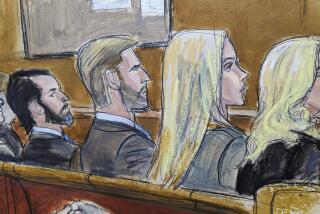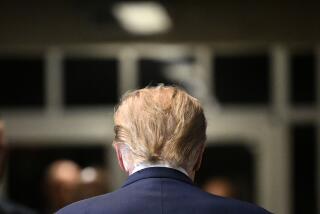Neither a Vindication Nor a Moral Testament
While Dakar is the capital of Senegal, a Muslim country, it is also a former French colony, so there was probably champagne in abundance for President Clinton’s party to raise toasts to Judge Susan Webber Wright, who on Wednesday dismissed the Paula Corbin Jones sexual harassment case. Excessive rejoicing at the downfall of Jones’ lawsuit, however, may not only be in bad taste but premature as well.
What has happened, after all, is that the federal judge in Little Rock conceded the possibility that every last allegation of groping, lunging and exposing made against Clinton may very well have been true. Unfortunately for Jones, the judge determined that she had not really been damaged in her career by the incident that allegedly took place in 1991 at the Excelsior Hotel in Little Rock.
While it is true that the president will not have to face the formal airing of the charges against him in the civil suit, much of what was really toothsome has already been leaked out of the pretrial documents by one side or the other. The public, then, is in the position of someone who has been denied entry to a movie whose plot, characters, dialogue and climax have already been revealed to them.
The dismissal of the Jones case certainly does not mean the end of the president’s legal problems. Independent Counsel Kenneth Starr is still in business and will proceed with characteristic zeal to pursue those charges associated with the now-defunct case that were not rendered moot by the decision. There are also the Whitewater matters that Starr was busying himself with before he became entangled in the Jones case.
If recent history is any guide, the bull market will continue its rampage and the president’s approval scores will soar into record territory, not necessarily because Americans think very highly of the man in the Oval Office, but because he is seen as a kind of amulet of prosperity. Nobody wants to impeach Santa Claus.
And don’t bet against Bill Clinton’s leaving the White House on Jan. 21, 2001 in normal constitutional style, to pursue the career of a youngish senior statesman. More problematical, however, is where this leaves the institution of the presidency in the eyes of the American people.
Bill Clinton’s very successes and current popularity with Americans sends a very clear message that you don’t have to be a person of exceptional character to be president. Indeed, you can score in the bottom quintile on the moral aptitude test and still enjoy the approval of the multitudes. But as Abraham Lincoln once observed, “Character is like a tree, and reputation like its shadow. The shadow is what we think of; the tree is the real thing.”
The president is not the Lincolnesque tree. He is a kind of political Houdini, a gifted escape artist who manages to elude snares and pitfalls--both those that have been set for him and those that he sets for himself. He is a notably lucky man, and some might see in his good fortune evidence that heaven is smiling on him. In a Machiavellian world, luck, adroitness and a personal gift for escape and evasion are counted among the capital virtues of statesmen. In the world of Florentine chicanery, the president would certainly be admired for his moves, but the historical reputation he is said to care so much about will profit little from his nimbleness.
The presidents whose reputations stand up to the test of history are those who endowed the office with more than impressive legislative box scores. Warren Harding presided over good times. Ulysses S. Grant enjoyed consistent popular acclaim. Yet each left the presidency diminished.
Perhaps the greatest loss suffered as the result of the many accusations, proved and unproved, admitted and denied, that swirl around this president is one that his apparent victory in the Paula Jones case will not repair. It is the expectation that Americans have of the office, that those who occupy it can be looked up to as more than a charming rogue or a lucky charm against hard times. That Paula Jones was found not to have suffered professionally is not a vindication of the president. Even less is it testament to his moral fiber.
More to Read
Sign up for Essential California
The most important California stories and recommendations in your inbox every morning.
You may occasionally receive promotional content from the Los Angeles Times.










